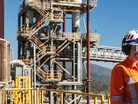Rio Tinto partners with ARENA for green hydrogen research

Rio Tinto has partnered with the Australian Renewable Energy Agency (ARENA) to study whether hydrogen can replace natural gas in alumina refineries to reduce emissions.
Rio Tinto and ARENA partnering for green energy push
Rio Tinto will conduct a $1.2mn feasibility study, equally funded with ARENA through a $580,000 grant, into using clean hydrogen to replace natural gas in the calcination process of refining at the Yarwun alumina refinery in Gladstone.
The study program includes work to be done at Rio Tinto’s Bundoora Technical Development Centre in Melbourne, where Rio Tinto’s in-house development capability has now been extended to hydrogen.
ARENA CEO Darren Miller commented: “If we can replace fossil fuels with clean hydrogen in the refining process for alumina, this will reduce emissions in the energy and emissions intensive refining stage of the aluminium supply chain. Exploring these new clean energy technologies and methods is a crucial step towards producing green aluminium.
“This study will investigate a potential technology that can contribute to the decarbonisation of the Australian alumina industry. If successful, the technical and commercial lessons from Rio Tinto’s study could lead to the implementation of hydrogen calcination technology, not only in Australia, but also internationally.”
Rio Tinto Aluminium Pacific Operations acting managing director Daniel van der Westhuizen added: “We see the ARENA and Rio Tinto-funded study as a step towards reducing refinery emissions and one that has the potential to play an important part in Rio Tinto’s commitment to decarbonisation.
“We’re investing in work that needs to be done, not only to decarbonise one of our sites, but also to help provide a lower-emissions pathway for Rio Tinto and the global aluminium industry.
“We recognise we are on a long road towards reducing emissions across our operations and there is clearly more work to be done. But projects such as this are an important part of helping us get there.”
Can hydrogen replace natural gas in alumina refineries?
The study comprises two distinct work packages:
- Preliminary engineering and design study conducted to understand the construction and operational requirements of a potential demonstration project at the Yarwun alumina refinery.
- Simulating the calcination process using a lab scale reactor at the Bundoora Technical Development Centre.
Once complete, the study will inform the viability of a potential demonstration project. Rio Tinto has lodged patents for the hydrogen calcination process.
Rio Tinto aiming for net zero by 2050
Rio Tinto is aiming to reach net zero emissions across its operations by 2050. Across the company, it is targeting a 15% reduction in absolute emissions and a 30% reduction in emissions intensity by 2030, from a 2018 baseline.
Aluminium is found in everything from cars to phones. But one of the challenges of producing this essential material responsibly is finding ways to decarbonise the process.
Part of the reason is creating alumina – the main ingredient in aluminium – takes a lot of energy, which in turn creates greenhouse gas emissions. New technologies will be essential to helping reduce emissions, but many haven’t been proven. And some not yet even discovered. Rio Tinto's transformation is being driven by innovation and its partnership with ARENA is a positive step towards these goals.



